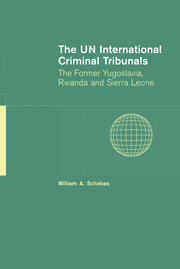Book contents
- Frontmatter
- Contents
- Preface
- Table of cases
- Table of legislative provisions
- List of abbreviations
- PART I Establishment of the tribunals
- PART II Jurisdiction
- PART III Substantive and procedural aspects of prosecution
- PART IV Organisation of the tribunals
- 15 Structure and administration of the tribunals
- Bibliography
- Index
15 - Structure and administration of the tribunals
Published online by Cambridge University Press: 05 June 2012
- Frontmatter
- Contents
- Preface
- Table of cases
- Table of legislative provisions
- List of abbreviations
- PART I Establishment of the tribunals
- PART II Jurisdiction
- PART III Substantive and procedural aspects of prosecution
- PART IV Organisation of the tribunals
- 15 Structure and administration of the tribunals
- Bibliography
- Index
Summary
The International Criminal Tribunal for the former Yugoslavia (ICTY) and the International Criminal Tribunal for Rwanda (ICTR) are ‘subsidiary organs’ of the United Nations Security Council, established in accordance with articles 7(2), 8 and 29 of the Charter of the United Nations. The Special Court for Sierra Leone (SCSL), on the other hand, is a distinct international organisation created pursuant to an agreement between the United Nations and the Government of Sierra Leone. The distinction operates principally in terms of modification to the respective statutes. Whereas the statutes of the ICTY and ICTR can be (and have been) amended by resolutions of the Security Council, any change to the Statute of the SCSL requires the written agreement of the two parties to the agreement that created it.
The structure of the three institutions is largely the same. They are divided into three main units: the Chambers (or judges); the Registry; and the Office of the Prosecutor (OTP). The Secretary-General explained this in his report to the Security Council on the draft ICTY Statute:
The organisation of the International Tribunal should reflect the functions to be performed by it. Since the International Tribunal is established for the prosecution of persons responsible for serious violations of international humanitarian law committed in the territory of the former Yugoslavia, this presupposes an international tribunal composed of a judicial organ, a prosecutorial organ and a secretariat. It would be the function of the prosecutorial organ to investigate cases, prepare indictments and prosecute persons responsible for committing the violations referred to above. […]
- Type
- Chapter
- Information
- The UN International Criminal TribunalsThe Former Yugoslavia, Rwanda and Sierra Leone, pp. 587 - 623Publisher: Cambridge University PressPrint publication year: 2006



